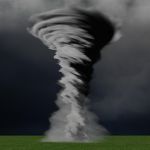 IMAGE COPYRIGHT
IMAGE COPYRIGHT Maths with a twist
Dive into the fascinating world of fluid dynamics!
Fluid dynamics is a subject with a long history - a virtual parade of famous mathematicians have explored the subject. Yet, we continue to make discoveries and find applications to our everyday life.
For example, we now have reliable 5-day weather forecasts and tornado warnings. Predictions of tides are applied to automated tsunami warnings and mathematical models of planetary flows are crucial for understanding climate change. Many challenging fluid problems involve vorticity.
On the small scale, one immediately thinks of turbulence, while vorticity on larger scales impact on the weather. For example, the so-called Rossby waves in the oceans are associated with a phenomenon known as "El Niņo" which affects meteorological conditions in the Pacific Ocean. These waves are relevant for astrophysics, especially for neutron stars for which they are thought to be a detectable source of gravitation radiation.
We all know what water is - and we know that it can be a lot of "fun" - but as this exhibit demonstrates, we do not understand all aspects of it.
Take part to our simple hands-on demonstrations of fluid behaviour, demonstrating fluid instabilities and vortex dynamics - linking to interesting problems on many different scales.
Fluid dynamics is a subject with a long history - a virtual parade of famous mathematicians have explored the subject. Yet, we continue to make discoveries and find applications to our everyday life.
For example, we now have reliable 5-day weather forecasts and tornado warnings. Predictions of tides are applied to automated tsunami warnings and mathematical models of planetary flows are crucial for understanding climate change. Many challenging fluid problems involve vorticity.
On the small scale, one immediately thinks of turbulence, while vorticity on larger scales impact on the weather. For example, the so-called Rossby waves in the oceans are associated with a phenomenon known as "El Niņo" which affects meteorological conditions in the Pacific Ocean. These waves are relevant for astrophysics, especially for neutron stars for which they are thought to be a detectable source of gravitation radiation.
We all know what water is - and we know that it can be a lot of "fun" - but as this exhibit demonstrates, we do not understand all aspects of it.
Take part to our simple hands-on demonstrations of fluid behaviour, demonstrating fluid instabilities and vortex dynamics - linking to interesting problems on many different scales.
You may also like

Can you hear the shape of a drum?
Can two drums with different shapes make the same sound? This question was posed long ago and is surprisingly difficult to answer. Come and try for yourself! Our Mathematicians ...Read More
Highfield Campus

Journeying through the world's bridges and uncovering the maths within
Join a journey back in time to the city of Konigsberg and its famous bridges! In this hands-on adventure, you will uncover the mathematical secrets behind journeying this iconic ci ...Read More
Highfield Campus
 - v2.jpg)
